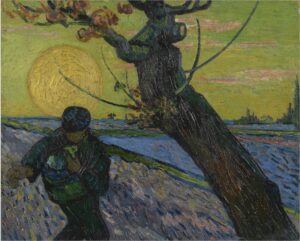Matthew 13:13: “This is why I speak to them in parables, because seeing they do not see, and hearing they do not hear, nor do they understand.”
Summary
In Matthew 13:13, Jesus explains His use of parables to reveal truths to those open to understanding while concealing them from indifference and hostility. His Parable of the Sower illustrates four responses to the gospel: along the path, where Satan snatches away the word (seed); rocky ground, where initial joy fades under persecution; thorns, where worldly cares choke faith; and good soil, where true believers bear spiritual fruit, indicating genuine salvation. Despite widespread access to the gospel, true salvation is marked by rare enduring faith and the production of spiritual fruit, contrasted with rejection, superficiality, and temporal responses.
The Sower and the Seed
Christ used parables to teach His disciples (and us) for several reasons. First, parables were a means to reveal truths to those open to receiving them and conceal truths from those indifferent, skeptical, or hostile. Second, to fulfill Prophecy, such as Isaiah 6:9- 10, “…hearing, but do not understand;…seeing, but do not perceive.” Third, to communicate the mysteries and principles of the Kingdom of Heaven in a form that required reflection and contemplation. Fourth, to provoke more profound thought and self-examination and challenge listeners to think beyond the surface to engage with the spiritual truths conveyed. And finally, fifth, to differentiate between those with genuine spiritual interest and those who are superficial in their engagement to Jesus’ teachings.
In Matthew 13:3-9, known as the Parable of the Sower and the Seed, Christ talks about a farmer’s seed that falls along the path, on rocky ground, among the thorns, and upon the good soil. In Matthew 13:19-23, Jesus explains that the seed is the Word, the sower is the evangelist or preacher, and the soil is the heart and soul of man. These four locations represent different responses to the gospel call. It is important to note that the Word that brings about salvation is the literal words of the Bible; as Paul explains in Romans 10:17, “So [saving] faith comes from hearing, and hearing through the word of Christ.”
Here is what Christ explains are the results of the gospel seed falling in these four allegorical areas.
Along the path – Matthew 13:19, “When anyone hears the Word of the kingdom and does not understand it, the evil one comes and snatches away what has been sown in his heart. This is what was sown along the path.”
These individuals are not saved. The Word never takes root in their hearts; thus, it never produces any fruit. This group represents a total rejection of the gospel message, often by Satan blinding the eyes of the unbelievers as recorded in 2 Corinthians 4:4, which states, “In their case the god of this world [Satan] has blinded the minds of the unbelievers, to keep them from seeing the light of the gospel of the glory of Christ, who is the image of God.”
On the rocky ground – Matthew 13:20-21, “As for what was sown on rocky ground, this is the one who hears the word and immediately receives it with joy, yet he has no root in himself, but endures for a while, and when tribulation or persecution arises on account of the word, immediately he falls away.”
These people are also not truly saved. Their initial enthusiastic response doesn’t translate into genuine faith. When difficulties come, they abandon their superficial beliefs, indicating that their initial response was not genuine saving faith. Soon, they are offended, either at the depth and profoundness of the Word, at its sanctity and strictness, or even at its plainness and simplicity.
Furthermore, identifying as a Christian has never been a popular worldly position. John 15:18 warns, “If you were of the world, the world would love you as its own; but because you are not of the world, but I chose you out of the world, therefore the world hates you.” Consequently, as soon as the old friends discover one’s new Christian faith and respond, typically with ridicule and disdain, the conversion is quickly dropped and the old lifestyle reinstated.
Among the thorns – Matthew 13:22, “As for what was sown among thorns, this is the one who hears the word, but the cares of the world and the deceitfulness of riches choke the word, and it proves unfruitful.”
Again, these individuals are not truly saved. Though they may appear interested or even involved in spiritual matters, their ultimate concern for worldly things and material wealth prevents the gospel from bearing fruit in their lives. John 2:15-17 expresses this conflict by stating, “Do not love the world or the things in the world. If anyone loves the world, the love of the Father is not in him. For all that is in the world—the desires of the flesh and the desires of the eyes and pride of life—is not from the Father but is from the world. And the world is passing away along with its desires, but whoever does the will of God abides forever.”
Such was the case of the rich young ruler who, upon asking Christ what he must do to be saved, responded in Matthew 19:20-22 by saying, “All these I have kept. What do I still lack?” Jesus said to him, “If you would be perfect, go, sell what you possess and give to the poor, and you will have treasure in heaven; and come, follow me.” When the young man heard this he went away sorrowful, for he had great possessions.”
Upon the good soil – Matthew 13:23, “As for what was sown on good soil, this is the one who hears the Word and understands it. He indeed bears fruit and yields, in one case a hundredfold, in another sixty, and in another thirty.”
These people are the truly saved individuals. The variation in the amount of fruit produced indicates that even among the truly saved, there can be differences in spiritual growth and productivity. This fruit or good works is confirmed in John 7:19-20, “…you will recognize them by their fruits.” Again, this is contrary to a mere initial emotional response or superficial involvement without the production of enduring fruit.
Conclusion
It is true today that the gospel has all but advanced to the entire world. Yet most will dismiss this simple message. Some will embrace it for a moment before persecution or concern for the cares of this world emerge, and even fewer will be genuinely redeemed. Those few will be saved and will be known by their fruit, which is a transformed life that produces good works, spiritual growth, and obedience to God.
But there is a real danger in rejecting the gospel as rocky road and thorny ground individuals as Hebrews 6:4-6 warns, “For it is impossible, in the case of those who have once been enlightened, who have tasted the heavenly gift, and have shared in the Holy Spirit, and have tasted the goodness of the word of God and the powers of the age to come, and then have fallen away, to restore them again to repentance, since they are crucifying once again the Son of God to their own harm and holding Him up to contempt.”
The truths in the Parable of the Sower are straightforward; only a small minority will be genuinely saved, while regrettably, a majority will renounce it either outright or, after a flirtatious moment, will fall away with only themselves to blame for the threat of never again being able to be restored.
Next week, the Parable of the Wheat and the Tares – is up to 70% of the U.S. Christian? Really?








